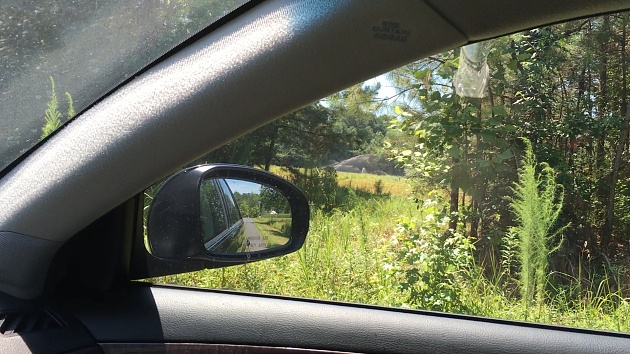
This post originally appeared on North Carolina Environmental Justice Network’s website.
Bullies don’t like it when you fight back. For decades, the multi-national corporations that control the hog industry in Eastern North Carolina have bullied people who live near hog facilities. Elsie Herring has been standing up to the industry since the mid-1990s, and she’s gotten a lot of attention. Now, the industry is hiding behind a public relations front group, NC Farm Families, in an effort to discredit Ms. Herring and unfairly minimize the suffering that comes with living next-door to an industrial hog facility.
Ms. Herring lives in Wallace, NC—in Duplin County, which hosts more than 2 million hogs– on land that has been in her family for over 100 years. A few decades ago, industrial hog facilities began to appear in Ms. Herring’s community—just as they did in many communities of color across eastern NC. As illustrated by this 2016 photo, showing the sprayfield near the corner of River Road and Beulah Herring Lane, Elsie’s home is now surrounded by these facilities, and her health and quality of life have suffered as a result. As Ms. Herring recently stated in the News & Observer, “My family, neighbors, and I have been held prisoner in our own homes by the unbearable stench from the multiple industrial hog operations within a quarter mile of my community.” Ms. Herring no longer dries her clothes on a clothesline, for fear that they would be covered by hog manure sprayed by the facility next-door. She doesn’t garden or entertain outdoors, and no longer uses her well or fishes or swims in nearby streams. Yet, in a gross dismissal of her suffering, NC Farm Families inaccurately claimed that Ms. Herring’s problems were resolved 18 years ago.
The industry claimed to have ended the problems its pollution causes by planting some trees. There’s some dispute about the distance between Elsie’s home and the nearest field where hog manure is being sprayed; however, this 2016 video footage [Video of Spraying] of the sprayfield closest to Elsie’s home (which NC Farm Families ignores in their recent attack, identifying only the sprayfields near River Road), makes clear that waste is still being sprayed very close to her house.
Even if we take industry spokespersons at their word, they’re distributing liquid waste within 200 feet of Ms. Herring’s property. These trees cannot—and do not—prevent wind from blowing manure onto Ms. Herring’s home and discouraging her from using her own property. Nor can they eliminate the noxious odor that permeates the air. Nor can they cure the groundwater pollution that prevents her from using her well. In short, planting trees was an inadequate measure taken long ago to address problems that persist today. Ms. Herring continues to suffer the effects of the hog facilities next-door, and she continues to speak out about the pollution from these operations—a burden that disproportionately harms African Americans, Latinos, and Native Americans.
By attacking Ms. Herring, the industry seeks to draw focus away from the system of environmental racism that it perpetuates. But Ms. Herring’s experience is, sadly, not unique. Instead, it is representative of the plight of countless North Carolinians who live near industrial hog facilities. Because of that reality, Ms. Herring has worked for years as an NCEJN community organizer to support those whose stories mirror her own. She is not alone in her suffering, and she is not alone in her advocacy.
The industry attack is also meant to discredit the Waterkeeper Alliance, which, along with NCEJN, seeks to raise up the voices of those harmed by pollution from industrial hog facilities. But this misleading attack serves only to emphasize the importance of standing united against the deceptive industrial hog industry. As Ms. Herring wrote in her op-ed, “I support family farmers, but the multi-billion dollar, multi-national corporation that owns 80 percent of the pigs in North Carolina is putting my family at risk.” Along with brave advocates like Ms. Herring, NCEJN and Waterkeeper Alliance will continue to work with our partners to promote health and environmental quality for all people of North Carolina. The polluting practices of the industrial hog industry demand a response, and we’re fighting back.